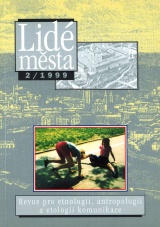Chinese Jump Rope in the Second Half of the 1990s
DOI:
https://doi.org/10.14712/12128112.4021Abstract
The "Chinese jump rope" game is at a present a stable part of the repertoire of children's formalised games. It was born in the 1950s as another possibility of solving the discrepancy between a limited room for children's games in the city and their need of movement. In the given moment it was a novelty within the framework of "stationary-dynamic" games of children in the city. Just as its "elder sisters" from the city - such as games with the skipping rope, various ball games and hopscotch - it needed a special game requisite and it was constructed as a succession of increasingly difficult exercises. Just as in the case of other games, it was, too, given its place by the adults in the street, in a courtyard or on a playground. Due to this, the Chinese jump rope has been mainly played in warm months of the year. The presented portrait of a children's formalised game - the Chinese jump rope - is based on a field research carried out in 1997-1998. The information was provided by children - especially the girls from the first, second, third and fourth classes of elementary schools in Prague 1 and Prague 3 as well as three girls from the first class of an eight-year secondary school in Prague 9. A certain image of the state of the Chinese jump rope in the 1970s, which will provide certain comparisons, was obtained on the basis of a preparatory research conducted among ten women born in Prague between 1964 and 1966. At present the game "Chinese jump rope" is very popular, especially with girls. It gradually pushes aut from the current game repertoire other games such as skipping the rope or the ball games. At the same time the playing of the Chinese jump rope is accompanied with a significant variation process which proves that the life of this folklore phenomenon is still on a rise. A transmission and at the same time transformation of basic skipping combinations which often arise due to the bad practice - learning or forgetting a game (in connection with the limitation of the game to the warm months of the year) - leads to constant establishment of new and new variants. Moreover, the very structure of the game provides opportunities for innovations, for introduction of new elements into the game. The basic skipping combinations and subsequently skipping configurations are being widened on the one hand, but special skipping patterns are becoming independent on the other. The quality of folklore - to be syncretic - plays a role here, too. A number of skipping configurations is linked with texts of nursery rhymes and songs which provide rhythm to the skipping game. Last but not least, the Chinese jump rope as a requisite inspires children to create game schemes which only have a marginal or no relation with the original, initial Chinese jump rope.
Downloads
Published
How to Cite
Issue
Section
License

This work is licensed under a Creative Commons Attribution-NonCommercial-NoDerivatives 4.0 International License.


